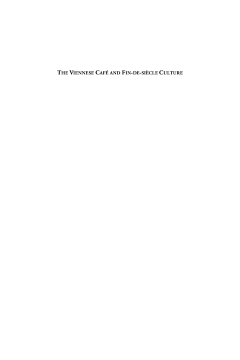
BOOK
The Viennese Café and Fin-de-Siècle Culture
Charlotte Ashby | Tag Gronberg | Simon Shaw-Miller
(2013)
Additional Information
Book Details
Abstract
The Viennese café was a key site of urban modernity around 1900. In the rapidly growing city it functioned simultaneously as home and workplace, affording opportunities for both leisure and intellectual exchange. This volume explores the nature and function of the coffeehouse in the social, cultural, and political world of fin-de-siècle Vienna. Just as the café served as a creative meeting place within the city, so this volume initiates conversations between different disciplines focusing on Vienna at the beginning of the twentieth century. Contributions are drawn from the fields of social and cultural history, literary studies, Jewish studies and art, and architectural and design history. A fresh perspective is also provided by a selection of comparative articles exploring coffeehouse culture elsewhere in Eastern Europe.
Charlotte Ashby is a Lecturer in Art and Design History at Birkbeck, University of London and the Courtauld Institute of Art. She was Postdoctoral Research Fellow on the Viennese Café Project at the Royal College of Art. In 2008 she curated the exhibition “Vienna Café 1900” at the Royal College of Art and co-convened the conference “The Viennese Café as an Urban Site of Cultural Exchange.”
Tag Gronberg, is a Reader in the History of Art and Design and a Tutor for Postgraduate Research in the Department of Art History, Birkbeck, University of London.
Simon Shaw-Miller is Professor of the History of Art at the University of Bristol. He is an Honorary Associate of the Royal Academy of Music, London. His publications include: Visible Deeds of Music: Music and Art from Wagner to Cage (Yale University Press 2002), Samuel Palmer Revisited (co-edited, Ashgate 2010) and Eye hEar: The Visual in Music (Ashgate 2013). He won the Prix Ars Electronica Media.Art.Research Award in 2009.
“Like a well-made Mélange, this volume is rich and satisfying.” · Slavonic and East European Review
“Eleven highly stimulating articles, including several dazzling ones....one of the most constructive... treatments that the subject has ever received.” · Contemporary Austrian Studies
“This volume forms a convincing starting point, in which the Viennese café is revealed as a key site of fin-de-siècle modernity and of several modern urban identities. One cannot but hope for a sequel — that is, an even more extensive volume but one that is just as carefully prepared with beautiful illustrations and very extensive footnotes.” · Austrian Studies
All in all, this work contains fascinating essays that indeed flesh out some of the intricate issues of literary life that lie behind a simple cup of coffee. The café was a place of refuge for many artists and writers; in addition, it acted as an active, lively, and, at times, boisterous place for political and social debate… For any course on fin-de-siècle Central Europe, this book will provide a necessary springboard into how and why intellectuals were so heavily invested in the modern times of the new century.” · Journal of Austrian Studies
